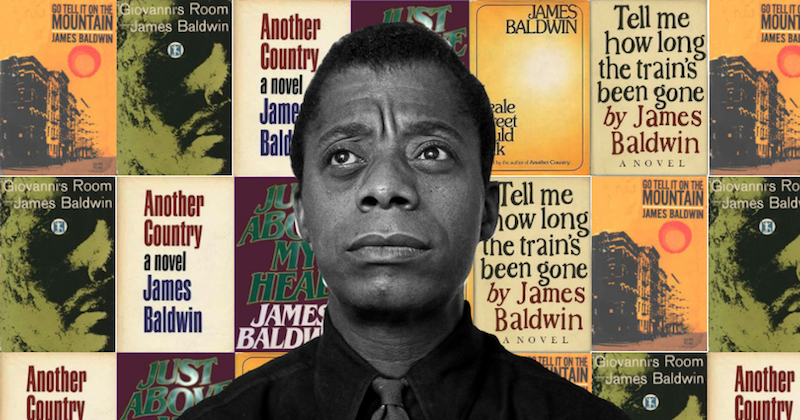James Baldwin is widely considered to be one of the finest writers and public intellectuals this country has ever produced. A brilliant novelist, essayist, and social critic, his explorations of homosexuality, racism, and class struggle in America have had a profound influence on the work of a generation of socially conscious authors, as well as countless readers and contemporary civil rights activists.
Though perhaps best known for his essays on the black experience in America, Baldwin was also an accomplished fiction writer who penned six novels, including the hugely influential Giovanni’s Room (1956)—which was groundbreaking in its complex and nuanced depiction of same-sex desire—and the Harlem-set love story (recently been adapted for the screen by Moonlight director Barry Jenkins) If Beale Street Could Talk (1974).
As today would have been Baldwin’s 99th birthday, we thought we’d take a look back at the first reviews of each of his novels. Not all of the initial reviews were positive (a cranky-sounding Mario Puzo absolutely hated Tell Me How Long the Train’s Been Gone, and Darryl Pinckney—who edited the 2015 Library of America collection of Baldwin’s later novels and has written beautifully about what Baldwin meant to him—was, as a young reviewer, unimpressed with what he saw as the sentimentality and forced polemical tone in Just Above My Head), but together they offer a fascinating window into the critical conversation happening around Baldwin’s fiction over the course of a quarter century.
*
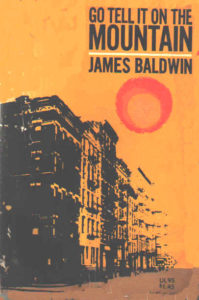
Go Tell It on the Mountain (1953)
John’s heart was hardened against the Lord.
His father was God’s minister, the ambassador of the King of Heaven,
and John could not bow before the throne of grace without first kneeling to his father.
“This book is about pietism in Harlem and, of the three sorts of novel (string, wind and percussion), it belongs to the first. It does not produce its story as an accumulation of shocks (as most novels of Negro life do), or by puffing into a rigid metaphysical system (as most novels about religion do); it makes its utterance by tension and friction.
The organizing event of the book is a 14-year-old boy’s first religious experience. This experience is a fit, a brutal, unexpected seizure: for poor little John Grimes is the son, or thinks he is, of a deacon in one of the stomping, moaning, falling sects that ululate in converted stores around Harlem, the metropolis of grief. As a matter of fact, John and his real father had never known of each other’s existence; Gabriel Grimes, a preaching widower up from the South, hard, without laughter, with a touch of the Messianic in his nature and a good deal of the trapped animal, had armed John’s mother and accepted John in explanation of his own carnal sins.
While John is in the holy spasm, Mr. Baldwin (who has really unusual substantive powers but conventional ingenuity in form) passes through three generations to find the antecedents of that hour. He has a curious attitude toward religion. He respects it. He does not find it comical, or anthropological, or pathetic. At his most grotesque, he will still have us know it in its own terms.
It is easy to explain. When the slaves, bred like animals and denied an equity in their own lives, were sent forth into monogamy, civil existence and the labor market, they received both freedom and the Law in the same instant. They then had the need of religion. In the religion that was most available (a vulgar export-model Puritanism) the notion of sin was central and fearfully inclusive. It included all but the most joyless releases of human needs. Guilt, guilt, guilt chimes through the book. Gabriel is guilty. His first wife Deborah is guilty, though she was the victim of rape. His second wife Elizabeth is guilty, though she loved much. Guilt is visited on his children. Hypocrisy will not sweeten the tragic dissonance. And guilt could not be removed, not by everyday contrition or penance—only by being born again altogether, as in baptism, but with huge pangs and convulsions. So it is writhing on the floor of ‘The Temple of the Fire Baptized’ that John is saved.
Judicious men in their chairs may explain the sociology of guilt, and so explain Negro religion away. Mr. Baldwin will not have it away. In this beautiful, furious first novel, there are no such reductions.”
–Donald Barr, The New York Times, May 17, 1953
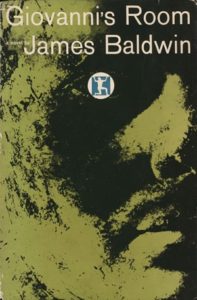
Giovanni’s Room (1956)
Perhaps home is not a place but simply an irrevocable condition.
“Whoever has read James Baldwin’s first novel, Go Tell It on the Mountain, or his collection of essays and sketches, Notes of a Native Son, knows him to be one of our gifted young writers. His most conspicuous gift is his ability to find words that astonish the reader with their boldness even as they overwhelm him with their rightness.
The theme of Giovanni’s Room is delicate enough to make strong demands on all of Mr. Baldwin’s resourcefulness and subtlety. We meet the narrator, known to us only as David, in the south of France, but most of the story is laid in Paris. It develops as the story of a young American involved both with a woman and with another man, the man being the Giovanni of the title. When a choice has to be made, David choose the woman, Hella.
David tells the story on a single night, the night before Giovanni is to be guillotined as a murderer. He tells of his life in Giovanni’s room, of deserting Giovanni for Hella and of making plans to marry her, of the effect of this on Giovanni, and of the effect of Giovanni’s plight on his own relations with Hella. Mr. Baldwin writes of these matters with an unusual degree of candor and yet with such dignity and intensity that he is saved from sensationalism.
Much of the novel is laid in scenes of squalor, with a background of characters as grotesque and repulsive as any that can be found in Proust’s Cities of the Plain. But even as one is dismayed by Mr. Baldwin’s materials, one rejoices in the skill with which he renders them. Nor is there any suspicion that he is working with these materials merely for the sake of shocking the reader. One the contrary, his intent is most serious. One of the lesser characters, in many ways a distasteful one, tells David that ‘not many people have ever died of love.’ ‘But,’ he goes on, ‘multitudes have perished, and are perishing every hour–and in the oddest places!–for the lack of it.’ This is Mr. Baldwin’s subject, the rareness and difficulty of love, and, in his rather startling way, he does a great deal with it.”
–Granville Hicks, The New York Times, October 14, 1956
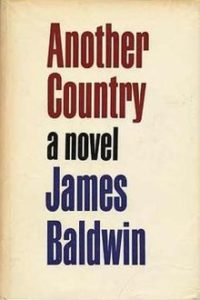
Another Country (1962)
We all commit our crimes. The thing is to not lie about them—to try to understand what you have done, why you have done it. That way, you can begin to forgive yourself. That’s very important. If you don’t forgive yourself you’ll never be able to forgive anybody else and you’ll go on committing the same crimes forever.
“The barriers of prejudice between us create new barriers within us—suspicion, self-contempt, the need for revenge—and these separate us still further. There is a modern triad of objects of prejudice: Jews, homosexuals and Negroes.
In Another Country, James Baldwin, who has made a name for himself with two previous novels and two collections of essays, studies the homosexuals and Negroes, often in parallel scenes. His plotting urges toward the breakdown of the barriers and the recovery of common humanity in love, a love that, in this book, invariably climaxes in sexual bouts. These are told frankly and pretty well, the homosexual ones somewhat better because they are less hectic and abrupt. The divisive barriers, on the other hand, he explores as far as sexual jealousy, and there are scenes of violence.
Unfortunately the persons of Another Country exist in a kind of vacuum: they do not have enough world to grow in, so love does not lead to community, procreation, productive collaboration, character change or even personal security. The author merely affirms their love to be important. And since there is not enough on-going world to support the jealous, their jealousy comes merely to sullenness and separation, without insight, liberation or useful grief.
…
“This is not much reality with which to reconstruct the dense world of a serious novel. There is no doubt that this tenuous kind of involvement is in fact the daily experience of millions of people in our society, and they ought to have their Homer. But to make them live, a writer would have to concentrate precisely on their lack of involvement—not on how they ‘make the scene,’ but on the important world they fail to make, on their goofing off.
Works like this therefore have a fictitious texture. As in prestigious Italian movies or cigarette ads that show the package in front of the landscape, the stars move in front of the scenery of the city, and we are supposed to be interested in their sentiments and interpersonal relations. But they are not in the city: they do not influence it, whether powerfully or humbly, they do not rebel against it, so there is no clash; it does not directly crush them, for they are preserved intact in their conceited isolation and illusions about themselves. So their story is not dramatic or terrible. Unless one ‘identifies’ with them (I never do), they are finally otiose.
These novels are a spurious genre. What the writer feels and dreams and somewhat knows is nailed on a wooden framework of narrative, though he is not really story-telling, and the whole is embedded in a cement of documentary background, to make like the world of a novel. In my opinion, these structures are produced only because there is a climate of publishing—for a bad (and big) audience—that demands these ‘identification’ yarns. I doubt that a writer like James Baldwin would go through this song and dance if he followed his best impulse. At his best his prose is very personal, sinuous yet definite, with a slight Negro accent, spare, and very sweet. But in a performance like this it is strained, sometimes journalistic or noisy, often in no idiom, and there are pages of dull conversation and filler. The finest passages, for instance the gentle marijuana session, are really independent episodes in which he can move freely.
I am judging by a high standard, but otherwise why bother? In the nature of the case, more serious books get more serious criticism; my guess is that Another Country has more substance than most books that receive highly respectful reviews. It is mediocre. It is unworthy of its author’s lovely abilities. Given his awareness (which he cannot escape), he must write something more poetic and surprising.”
–Paul Goodman, The New York Times, June 24, 1962
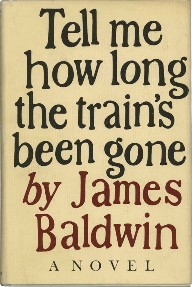
Tell Me How Long the Train’s Been Gone (1968)
Everyone wishes to be loved, but in the event, nearly no one can bear it.
“Tragedy calls out for a great artist, revolution for a true prophet. Six years ago, James Baldwin predicted the black revolution that is now changing our society. His new novel, Tell Me How Long the Train’s Been Gone is his attempt to recreate, as an artist this time, the tragic condition of the Negro, in America. He has not been successful; this is a simpleminded, one-dimensional novel with mostly cardboard characters, a polemical rather than narrative tone, weak invention and poor selection of incident. Individual scenes have people talking too much for what the author has to say and crucial events are ‘told’ by one character to another rather than created. The contruction of the novel is theatrical, tidily nailed into a predictable form.
It becomes clearer with each book he publishes that Baldwin’s reputation is justified by his essays rather than his fiction. It may be that he is not a true or ‘born’ novelist. But it must be said that his essays are as well written as any in our language; in them his thought and its utterance are nothing less than majestical. He has, also, the virtues of passion, serious intelligence and compassionate understanding of his fellow man. Yet it would seem that such gifts, enough for critics and moralists and other saintly figures, are not enough to insure the writing of good fiction. Novelists are born sinners and their salvation does not come so easily, and certainly the last role the artist should play is that of the prosecutor, the creator of a propaganda novel. A propaganda novel may be socially valuable (Grapes of Wrath, Gentlemen’s Agreement), but it is not art.
…
“Baldwin’s greatest weakness as a novelist is his selection or creation of incident. Time and again his conclusions are not justified by narrative action. Too many of his characters are mere cardboard. There are scenes that are simply echoes of the literature of the thirties, and they were cornball even then.
It is possible that Baldwin believes this is not tactically the time for art, that polemical fiction can help the Negro cause more, that art is too strong, too gamy a dish for a prophet to offer now. And so he gives us propagandistic fiction, a readable book with a positive social value. If this is what he wants, he has been successful. But perhaps it is not time for Baldwin to forget the black revolution and start worrying about himself as an artist, who is the ultimate revolutionary.”
–Mario Puzo, The New York Times, June 23, 1968
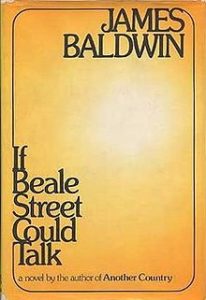
If Beale Street Could Talk (1974)
Neither love nor terror makes one blind: indifference makes one blind.
“James Baldwin’s career has not been an even one, and his life as a writer cannot have been, so far, very placid. He has been both praised and, in recent years, denounced for the wrong reasons. The black writer, if he is not being patronized simply for being black, is in danger of being attacked for not being black enough. Or he is forced to represent a mass of people, his unique vision assumed to be symbolic of a collective vision. In some circles he cannot lose—his work will be praised without being read, which must be the worst possible fate for a serious writer. And, of course, there are circles, perhaps those nearest home, in which he cannot ever win—for there will be people who resent the mere fact of his speaking of them, whether he intends to speak for them or not.
If Beale Street Could Talk is Baldwin’s 13th book and it might have been written, if not revised for publication, in the 1950’s. Its suffering, bewildered people, trapped in what is referred to as the ‘garbage dump’ of New York City—blacks constantly at the mercy of whites—have not even the psychological benefit of the Black Power and other radical movements to sustain them. Though their story should seem dated, it does not. And the peculiar fact of their being so politically helpless seems to have strengthened, in Baldwin’s imagination at least, the deep, powerful bonds of emotion between them. If Beale Street Could Talk is a quite moving and very traditional celebration of love. It affirms not only love between a man and a woman, but love of a type that is dealt with only rarely in contemporary fiction—that between members of a family, which may involve extremes of sacrifice.
A sparse, slender narrative, told first-person by a 19-year-old named Tish, If Beale Street Could Talk manages to be many things at the same time. It is economically, almost poetically constructed, and may certainly be read as a kind of allegory, which refuses conventional outbursts of violence, preferring to stress the provisional, tentative nature of our lives. A 22- year-old black man, a sculptor, is arrested and booked for a crime—rape of a Puerto Rican woman—which he did not commit. The only black man in a police line-up, he is ‘identified’ by the distraught, confused woman, whose testimony is partly shaped by a white policeman. Fonny, the sculptor, is innocent, yet it is up to the accused and his family to prove ‘and to pay for proving’ this simple fact.
…
“The novel progresses swiftly and suspensefully, but its dynamic movement is interior. Baldwin constantly understates the horror of his characters’ situation in order to present them as human beings whom disaster has struck, rather than as blacks who have, typically, been victimized by whites and are therefore likely subjects for a novel. The work contains many sympathetic portraits of white people, especially Fonny’s harassed white lawyer, whose position is hardly better that the blacks he defends. And, in a masterly stroke, Tish’s mother travels to Puerto Rico in an attempt to reason with the woman who has accused her prospective son-in-law of rape, only to realize, there, a poverty and helplessness more extreme that that endured by the blacks of New York City.
…
“Yet the novel is ultimately optimistic. It stresses the communal bond between members of an oppressed minority, especially between members of a family, which would probably not be experienced in happier times. As society disintegrates in a collective sense, smaller human unity will become more and more important. Those who are without them, like Fonny’s friend Daniel, will probably not survive. Certainly they will not reproduce themselves. Fonny’s real crime is ‘having his center inside him,’ but this is, ultimately, the means by which he survives. Others are less fortunate.
If Beale Street Could Talk is a moving, painful story. It is so vividly human and so obviously based upon reality, that it strikes us as timeless—an art that has not the slightest need of esthetic tricks, and even less need of fashionable apocalyptic excesses.
–Joyce Carol Oates, The New York Times, May 19, 1974
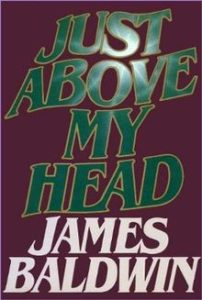
Just Above My Head (1979)
I prefer sinners and madmen, who can learn, who can change, who can teach—or people like myself, if I may say so, who are not afraid to eat a lobster alone as they take on their shoulders the monumental weight of thirty years
“Moralistic fervor, a high literary seriousness, the authority of the survivor, of the witness—these qualities made Baldwin unique. In his best work, he is drawn to the ways in which life can go wildly wrong, to examinations of the damage done the individual by society. Another bloodied stone is always waiting to be turned over. A sense of mission has guided Baldwin’s development as a writer. He was truly born with his subject matter, and yet for a long time his work showed a feeling of distrust for the promises of ‘pure’ literature, a sense of its impotence, both personally and as a political weapon. In his youth Baldwin wanted to be identified not as a black but as a writer. It is a conflict he has never resolved.
Just Above My Head is a long and ambitious novel in which we find again many of Baldwin’s obsessions. He returns to the Harlem and the church of his first novel, Go Tell It on the Mountain (1953); to the homosexuality of Giovanni’s Room(1955) and Another Country (1962); and to the social and political outrage that has inspired all his work. Whether the visions of the past are still vivid is another question.
Hall Montana, the narrator of Just Above My Head, tells the story of his dead brother Arthur, a celebrated gospel singer, and in so doing Hall hopes to make sense of his own life, shatter his grief.
…
“Arthur himself never emerges from the shadows of his brother’s descriptions, but it is clear that he is very different from the subversive heroes of Baldwin’s earlier novels. He is homosexual, but seen sentimentally, continually as a member of a family, the doting younger brother, the loving son. He is meant to be a kind of artist hero, hardworking, dedicated, tragically undone by the rages of their lives. He unfortunately lacks the willfulness and chaotic interest of other artists in Baldwin’s fiction—the jazz musician Rufus Scott in Another Country, the actor Leo Proudhammer in Tell Me How Long the Train’s Been Gone (1968). For Baldwin, the time for a daring portrayal of the homosexual as outcast appears to have passed. He seems now to be trying to make a sentimental truce between the outcast and the family, meaning the black community.
…
“Abandoning his idealism about love, Baldwin now writes sentimentally not only about Arthur but about the entire Montana family. The parents are wise, forgiving, and everyone is uniformly resilient and ‘caring.’ If Baldwin means to honor the family as one of the reasons why blacks have, if nothing else, survived, his way of doing so is hardly convincing. Giving to the family generous amounts of noble qualities results in a neat symmetry: us versus them. The hagiographic approach helps to account for the flatness and didacticism of this work, as it did of Baldwin’s last novel, If Beale Street Could Talk (1974), a book that was also dogmatic in its insistence on families and marriage as joyous alliances against an oppressively conceived ‘them.’ From Baldwin’s other writings, one knows he has had a far more complicated idea of the family.
…
“It would appear from this book that he is weary of battling alone and wishes for a wider, more popular acceptance, a coming home to the ‘folk.’ There is a sad irony here. When Baldwin was young, in Paris, he quarreled with his ‘spiritual father,’ Richard Wright, over Baldwin’s attack on the genre of protest novels. Wright felt betrayed and Baldwin defended himself by saying that all literature may be protest but not all protest was literature. Later, when recalling Wright’s isolation from other blacks in Paris, his aloneness, his alienation, Baldwin wrote: ‘I could not help feeling: Be Careful. Time is passing for you, too, and this may be happening to you one day.’ Baldwin now writes as if he is haunted by this prophecy. Just Above My Head, with its forced polemical tone, represents a conversion of sorts, a conversion to simplicities that so fine a mind as Baldwin’s cannot embrace without grave loss.”
–Darryl Pinckney, The New York Review of Books, December 6, 1979
